Mabo v Queensland: Securing Native Title Rights Under 1993 Act
VerifiedAdded on 2023/06/14
|8
|1952
|193
Essay
AI Summary
This essay explores the landmark Mabo and Others v Queensland (No. 2) case and its profound impact on native title rights in Australia. It discusses how the decision challenged the terra nullius doctrine and paved the way for the Native Title Act 1993, which aimed to protect and recognize indigenous land rights. The essay highlights the significance of the Mabo case in acknowledging the connection of Aboriginal and Torres Strait Islander peoples to their land, and how the Native Title Act provides a framework for coexistence and determination of native title claims. It also touches on the Wik Peoples v Queensland case, which further clarified the coexistence of native title with pastoral leases, emphasizing the ongoing importance of these legal milestones in securing indigenous rights in Australia. Desklib offers similar solved assignments and past papers for students.
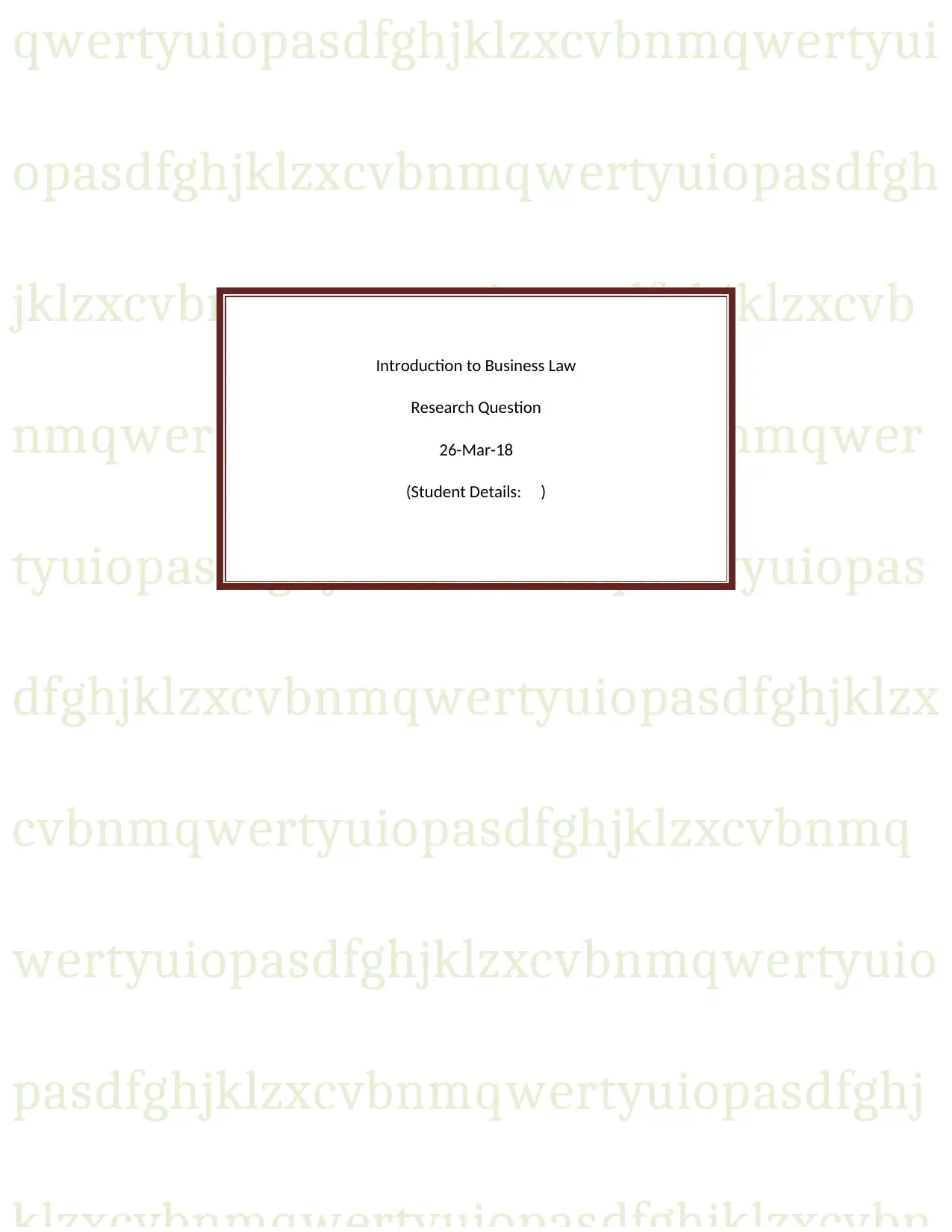
qwertyuiopasdfghjklzxcvbnmqwertyui
opasdfghjklzxcvbnmqwertyuiopasdfgh
jklzxcvbnmqwertyuiopasdfghjklzxcvb
nmqwertyuiopasdfghjklzxcvbnmqwer
tyuiopasdfghjklzxcvbnmqwertyuiopas
dfghjklzxcvbnmqwertyuiopasdfghjklzx
cvbnmqwertyuiopasdfghjklzxcvbnmq
wertyuiopasdfghjklzxcvbnmqwertyuio
pasdfghjklzxcvbnmqwertyuiopasdfghj
Introduction to Business Law
Research Question
26-Mar-18
(Student Details: )
opasdfghjklzxcvbnmqwertyuiopasdfgh
jklzxcvbnmqwertyuiopasdfghjklzxcvb
nmqwertyuiopasdfghjklzxcvbnmqwer
tyuiopasdfghjklzxcvbnmqwertyuiopas
dfghjklzxcvbnmqwertyuiopasdfghjklzx
cvbnmqwertyuiopasdfghjklzxcvbnmq
wertyuiopasdfghjklzxcvbnmqwertyuio
pasdfghjklzxcvbnmqwertyuiopasdfghj
Introduction to Business Law
Research Question
26-Mar-18
(Student Details: )
Paraphrase This Document
Need a fresh take? Get an instant paraphrase of this document with our AI Paraphraser
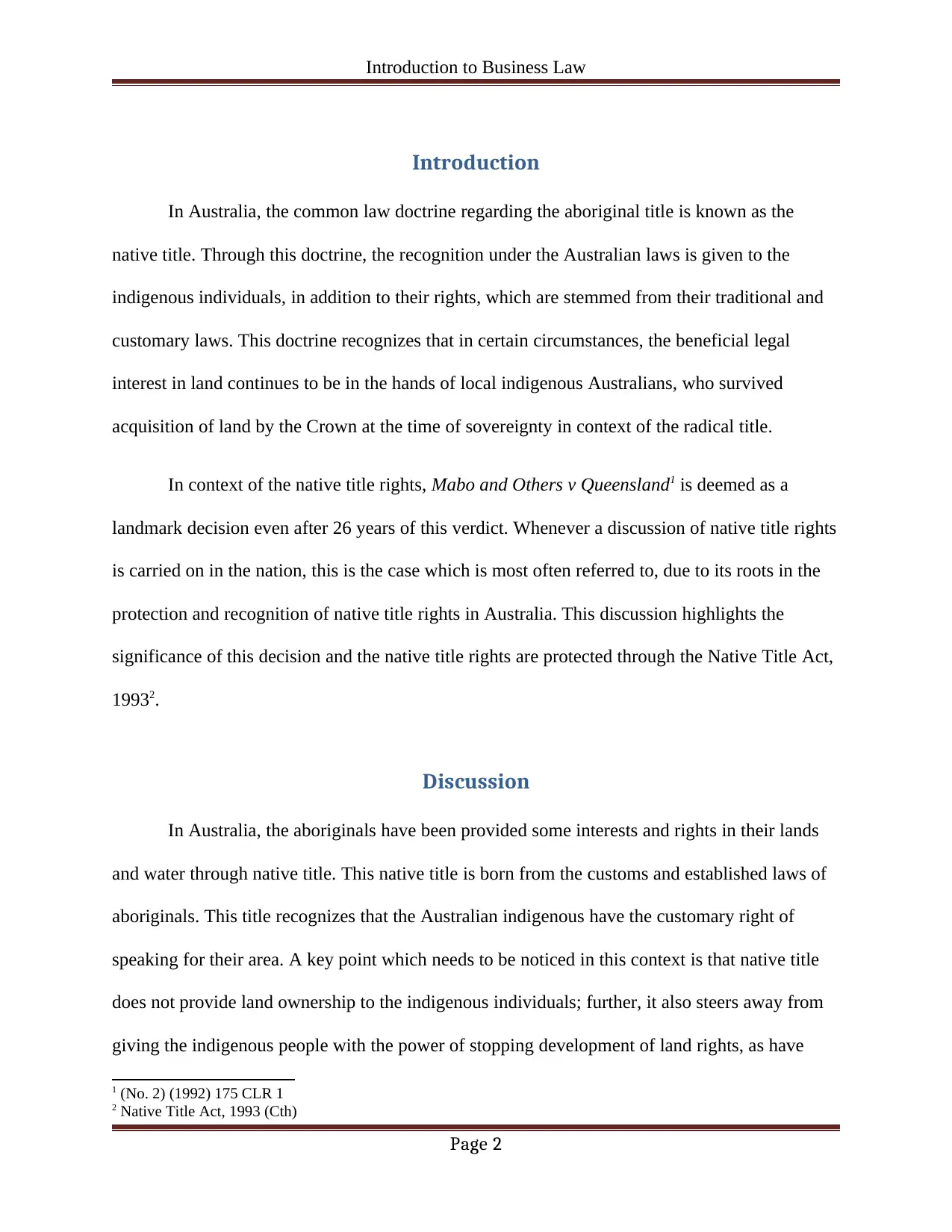
Introduction to Business Law
Introduction
In Australia, the common law doctrine regarding the aboriginal title is known as the
native title. Through this doctrine, the recognition under the Australian laws is given to the
indigenous individuals, in addition to their rights, which are stemmed from their traditional and
customary laws. This doctrine recognizes that in certain circumstances, the beneficial legal
interest in land continues to be in the hands of local indigenous Australians, who survived
acquisition of land by the Crown at the time of sovereignty in context of the radical title.
In context of the native title rights, Mabo and Others v Queensland1 is deemed as a
landmark decision even after 26 years of this verdict. Whenever a discussion of native title rights
is carried on in the nation, this is the case which is most often referred to, due to its roots in the
protection and recognition of native title rights in Australia. This discussion highlights the
significance of this decision and the native title rights are protected through the Native Title Act,
19932.
Discussion
In Australia, the aboriginals have been provided some interests and rights in their lands
and water through native title. This native title is born from the customs and established laws of
aboriginals. This title recognizes that the Australian indigenous have the customary right of
speaking for their area. A key point which needs to be noticed in this context is that native title
does not provide land ownership to the indigenous individuals; further, it also steers away from
giving the indigenous people with the power of stopping development of land rights, as have
1 (No. 2) (1992) 175 CLR 1
2 Native Title Act, 1993 (Cth)
Page 2
Introduction
In Australia, the common law doctrine regarding the aboriginal title is known as the
native title. Through this doctrine, the recognition under the Australian laws is given to the
indigenous individuals, in addition to their rights, which are stemmed from their traditional and
customary laws. This doctrine recognizes that in certain circumstances, the beneficial legal
interest in land continues to be in the hands of local indigenous Australians, who survived
acquisition of land by the Crown at the time of sovereignty in context of the radical title.
In context of the native title rights, Mabo and Others v Queensland1 is deemed as a
landmark decision even after 26 years of this verdict. Whenever a discussion of native title rights
is carried on in the nation, this is the case which is most often referred to, due to its roots in the
protection and recognition of native title rights in Australia. This discussion highlights the
significance of this decision and the native title rights are protected through the Native Title Act,
19932.
Discussion
In Australia, the aboriginals have been provided some interests and rights in their lands
and water through native title. This native title is born from the customs and established laws of
aboriginals. This title recognizes that the Australian indigenous have the customary right of
speaking for their area. A key point which needs to be noticed in this context is that native title
does not provide land ownership to the indigenous individuals; further, it also steers away from
giving the indigenous people with the power of stopping development of land rights, as have
1 (No. 2) (1992) 175 CLR 1
2 Native Title Act, 1993 (Cth)
Page 2
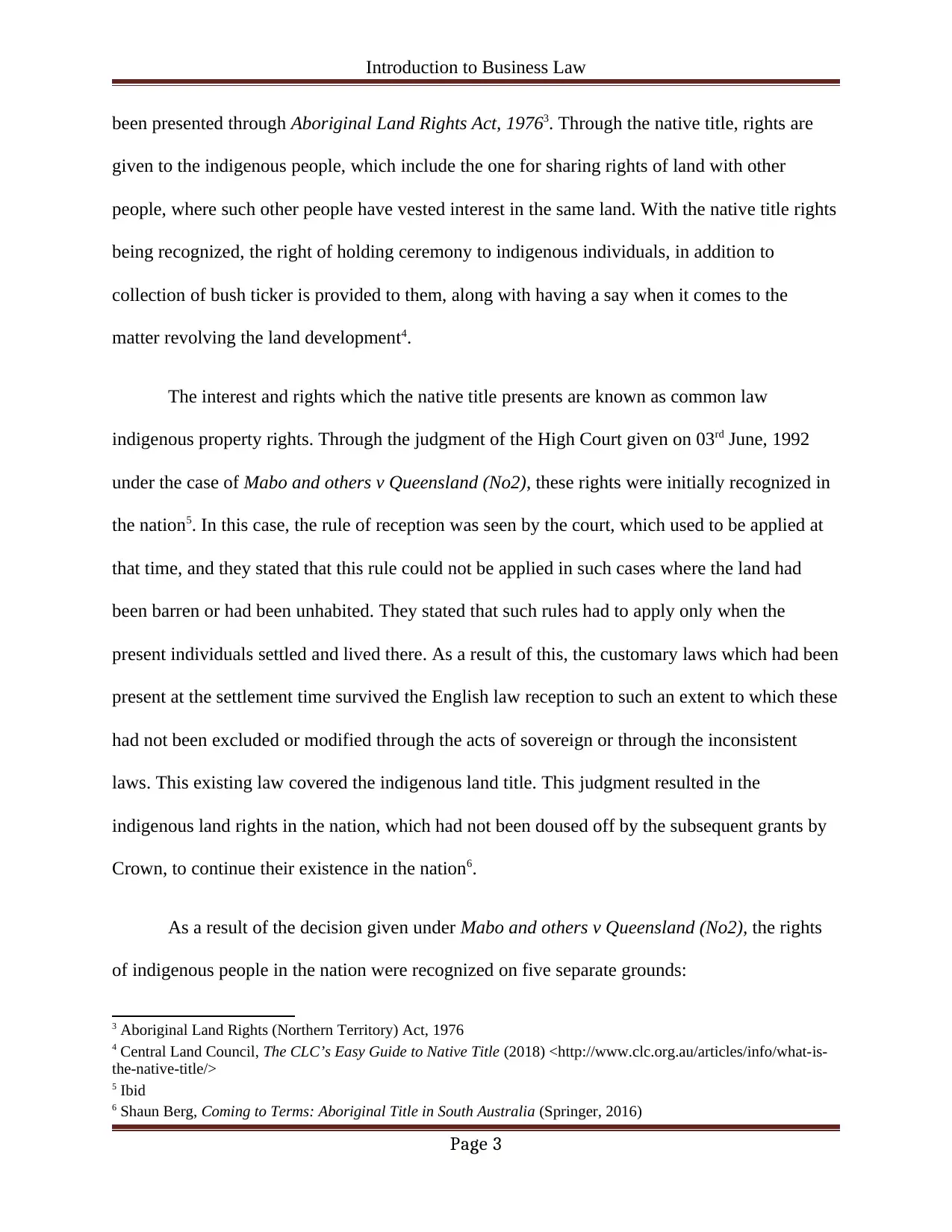
Introduction to Business Law
been presented through Aboriginal Land Rights Act, 19763. Through the native title, rights are
given to the indigenous people, which include the one for sharing rights of land with other
people, where such other people have vested interest in the same land. With the native title rights
being recognized, the right of holding ceremony to indigenous individuals, in addition to
collection of bush ticker is provided to them, along with having a say when it comes to the
matter revolving the land development4.
The interest and rights which the native title presents are known as common law
indigenous property rights. Through the judgment of the High Court given on 03rd June, 1992
under the case of Mabo and others v Queensland (No2), these rights were initially recognized in
the nation5. In this case, the rule of reception was seen by the court, which used to be applied at
that time, and they stated that this rule could not be applied in such cases where the land had
been barren or had been unhabited. They stated that such rules had to apply only when the
present individuals settled and lived there. As a result of this, the customary laws which had been
present at the settlement time survived the English law reception to such an extent to which these
had not been excluded or modified through the acts of sovereign or through the inconsistent
laws. This existing law covered the indigenous land title. This judgment resulted in the
indigenous land rights in the nation, which had not been doused off by the subsequent grants by
Crown, to continue their existence in the nation6.
As a result of the decision given under Mabo and others v Queensland (No2), the rights
of indigenous people in the nation were recognized on five separate grounds:
3 Aboriginal Land Rights (Northern Territory) Act, 1976
4 Central Land Council, The CLC’s Easy Guide to Native Title (2018) <http://www.clc.org.au/articles/info/what-is-
the-native-title/>
5 Ibid
6 Shaun Berg, Coming to Terms: Aboriginal Title in South Australia (Springer, 2016)
Page 3
been presented through Aboriginal Land Rights Act, 19763. Through the native title, rights are
given to the indigenous people, which include the one for sharing rights of land with other
people, where such other people have vested interest in the same land. With the native title rights
being recognized, the right of holding ceremony to indigenous individuals, in addition to
collection of bush ticker is provided to them, along with having a say when it comes to the
matter revolving the land development4.
The interest and rights which the native title presents are known as common law
indigenous property rights. Through the judgment of the High Court given on 03rd June, 1992
under the case of Mabo and others v Queensland (No2), these rights were initially recognized in
the nation5. In this case, the rule of reception was seen by the court, which used to be applied at
that time, and they stated that this rule could not be applied in such cases where the land had
been barren or had been unhabited. They stated that such rules had to apply only when the
present individuals settled and lived there. As a result of this, the customary laws which had been
present at the settlement time survived the English law reception to such an extent to which these
had not been excluded or modified through the acts of sovereign or through the inconsistent
laws. This existing law covered the indigenous land title. This judgment resulted in the
indigenous land rights in the nation, which had not been doused off by the subsequent grants by
Crown, to continue their existence in the nation6.
As a result of the decision given under Mabo and others v Queensland (No2), the rights
of indigenous people in the nation were recognized on five separate grounds:
3 Aboriginal Land Rights (Northern Territory) Act, 1976
4 Central Land Council, The CLC’s Easy Guide to Native Title (2018) <http://www.clc.org.au/articles/info/what-is-
the-native-title/>
5 Ibid
6 Shaun Berg, Coming to Terms: Aboriginal Title in South Australia (Springer, 2016)
Page 3
⊘ This is a preview!⊘
Do you want full access?
Subscribe today to unlock all pages.

Trusted by 1+ million students worldwide
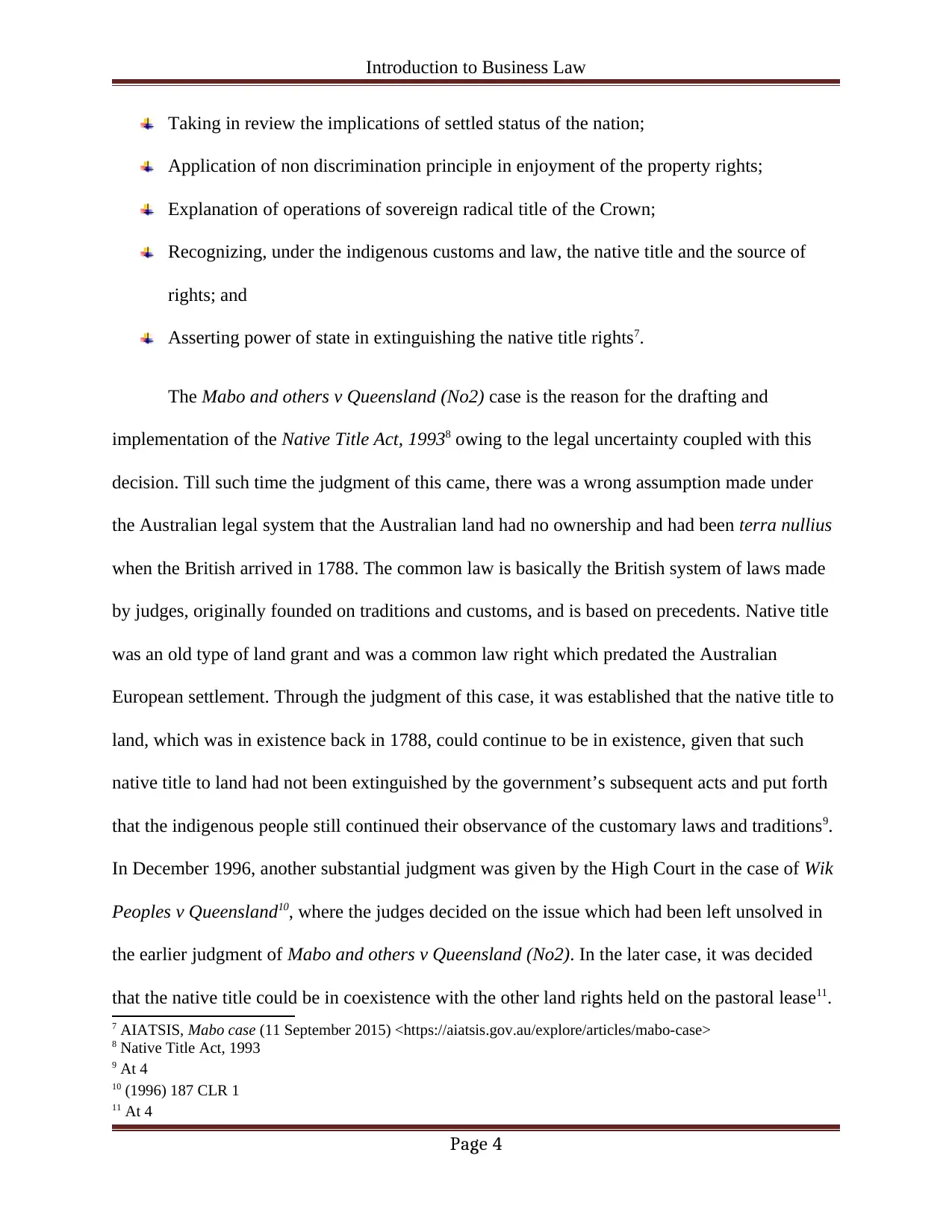
Introduction to Business Law
Taking in review the implications of settled status of the nation;
Application of non discrimination principle in enjoyment of the property rights;
Explanation of operations of sovereign radical title of the Crown;
Recognizing, under the indigenous customs and law, the native title and the source of
rights; and
Asserting power of state in extinguishing the native title rights7.
The Mabo and others v Queensland (No2) case is the reason for the drafting and
implementation of the Native Title Act, 19938 owing to the legal uncertainty coupled with this
decision. Till such time the judgment of this came, there was a wrong assumption made under
the Australian legal system that the Australian land had no ownership and had been terra nullius
when the British arrived in 1788. The common law is basically the British system of laws made
by judges, originally founded on traditions and customs, and is based on precedents. Native title
was an old type of land grant and was a common law right which predated the Australian
European settlement. Through the judgment of this case, it was established that the native title to
land, which was in existence back in 1788, could continue to be in existence, given that such
native title to land had not been extinguished by the government’s subsequent acts and put forth
that the indigenous people still continued their observance of the customary laws and traditions9.
In December 1996, another substantial judgment was given by the High Court in the case of Wik
Peoples v Queensland10, where the judges decided on the issue which had been left unsolved in
the earlier judgment of Mabo and others v Queensland (No2). In the later case, it was decided
that the native title could be in coexistence with the other land rights held on the pastoral lease11.
7 AIATSIS, Mabo case (11 September 2015) <https://aiatsis.gov.au/explore/articles/mabo-case>
8 Native Title Act, 1993
9 At 4
10 (1996) 187 CLR 1
11 At 4
Page 4
Taking in review the implications of settled status of the nation;
Application of non discrimination principle in enjoyment of the property rights;
Explanation of operations of sovereign radical title of the Crown;
Recognizing, under the indigenous customs and law, the native title and the source of
rights; and
Asserting power of state in extinguishing the native title rights7.
The Mabo and others v Queensland (No2) case is the reason for the drafting and
implementation of the Native Title Act, 19938 owing to the legal uncertainty coupled with this
decision. Till such time the judgment of this came, there was a wrong assumption made under
the Australian legal system that the Australian land had no ownership and had been terra nullius
when the British arrived in 1788. The common law is basically the British system of laws made
by judges, originally founded on traditions and customs, and is based on precedents. Native title
was an old type of land grant and was a common law right which predated the Australian
European settlement. Through the judgment of this case, it was established that the native title to
land, which was in existence back in 1788, could continue to be in existence, given that such
native title to land had not been extinguished by the government’s subsequent acts and put forth
that the indigenous people still continued their observance of the customary laws and traditions9.
In December 1996, another substantial judgment was given by the High Court in the case of Wik
Peoples v Queensland10, where the judges decided on the issue which had been left unsolved in
the earlier judgment of Mabo and others v Queensland (No2). In the later case, it was decided
that the native title could be in coexistence with the other land rights held on the pastoral lease11.
7 AIATSIS, Mabo case (11 September 2015) <https://aiatsis.gov.au/explore/articles/mabo-case>
8 Native Title Act, 1993
9 At 4
10 (1996) 187 CLR 1
11 At 4
Page 4
Paraphrase This Document
Need a fresh take? Get an instant paraphrase of this document with our AI Paraphraser
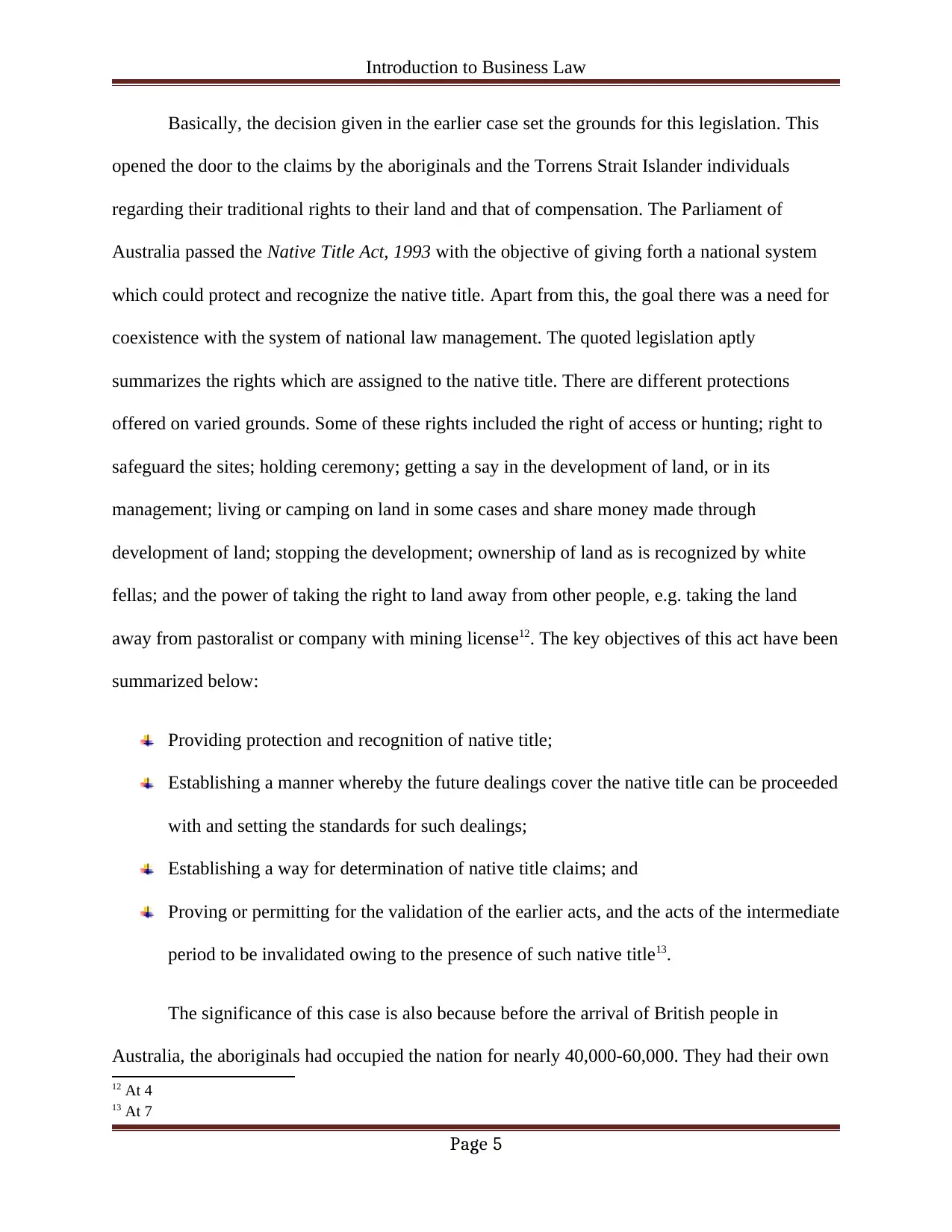
Introduction to Business Law
Basically, the decision given in the earlier case set the grounds for this legislation. This
opened the door to the claims by the aboriginals and the Torrens Strait Islander individuals
regarding their traditional rights to their land and that of compensation. The Parliament of
Australia passed the Native Title Act, 1993 with the objective of giving forth a national system
which could protect and recognize the native title. Apart from this, the goal there was a need for
coexistence with the system of national law management. The quoted legislation aptly
summarizes the rights which are assigned to the native title. There are different protections
offered on varied grounds. Some of these rights included the right of access or hunting; right to
safeguard the sites; holding ceremony; getting a say in the development of land, or in its
management; living or camping on land in some cases and share money made through
development of land; stopping the development; ownership of land as is recognized by white
fellas; and the power of taking the right to land away from other people, e.g. taking the land
away from pastoralist or company with mining license12. The key objectives of this act have been
summarized below:
Providing protection and recognition of native title;
Establishing a manner whereby the future dealings cover the native title can be proceeded
with and setting the standards for such dealings;
Establishing a way for determination of native title claims; and
Proving or permitting for the validation of the earlier acts, and the acts of the intermediate
period to be invalidated owing to the presence of such native title13.
The significance of this case is also because before the arrival of British people in
Australia, the aboriginals had occupied the nation for nearly 40,000-60,000. They had their own
12 At 4
13 At 7
Page 5
Basically, the decision given in the earlier case set the grounds for this legislation. This
opened the door to the claims by the aboriginals and the Torrens Strait Islander individuals
regarding their traditional rights to their land and that of compensation. The Parliament of
Australia passed the Native Title Act, 1993 with the objective of giving forth a national system
which could protect and recognize the native title. Apart from this, the goal there was a need for
coexistence with the system of national law management. The quoted legislation aptly
summarizes the rights which are assigned to the native title. There are different protections
offered on varied grounds. Some of these rights included the right of access or hunting; right to
safeguard the sites; holding ceremony; getting a say in the development of land, or in its
management; living or camping on land in some cases and share money made through
development of land; stopping the development; ownership of land as is recognized by white
fellas; and the power of taking the right to land away from other people, e.g. taking the land
away from pastoralist or company with mining license12. The key objectives of this act have been
summarized below:
Providing protection and recognition of native title;
Establishing a manner whereby the future dealings cover the native title can be proceeded
with and setting the standards for such dealings;
Establishing a way for determination of native title claims; and
Proving or permitting for the validation of the earlier acts, and the acts of the intermediate
period to be invalidated owing to the presence of such native title13.
The significance of this case is also because before the arrival of British people in
Australia, the aboriginals had occupied the nation for nearly 40,000-60,000. They had their own
12 At 4
13 At 7
Page 5
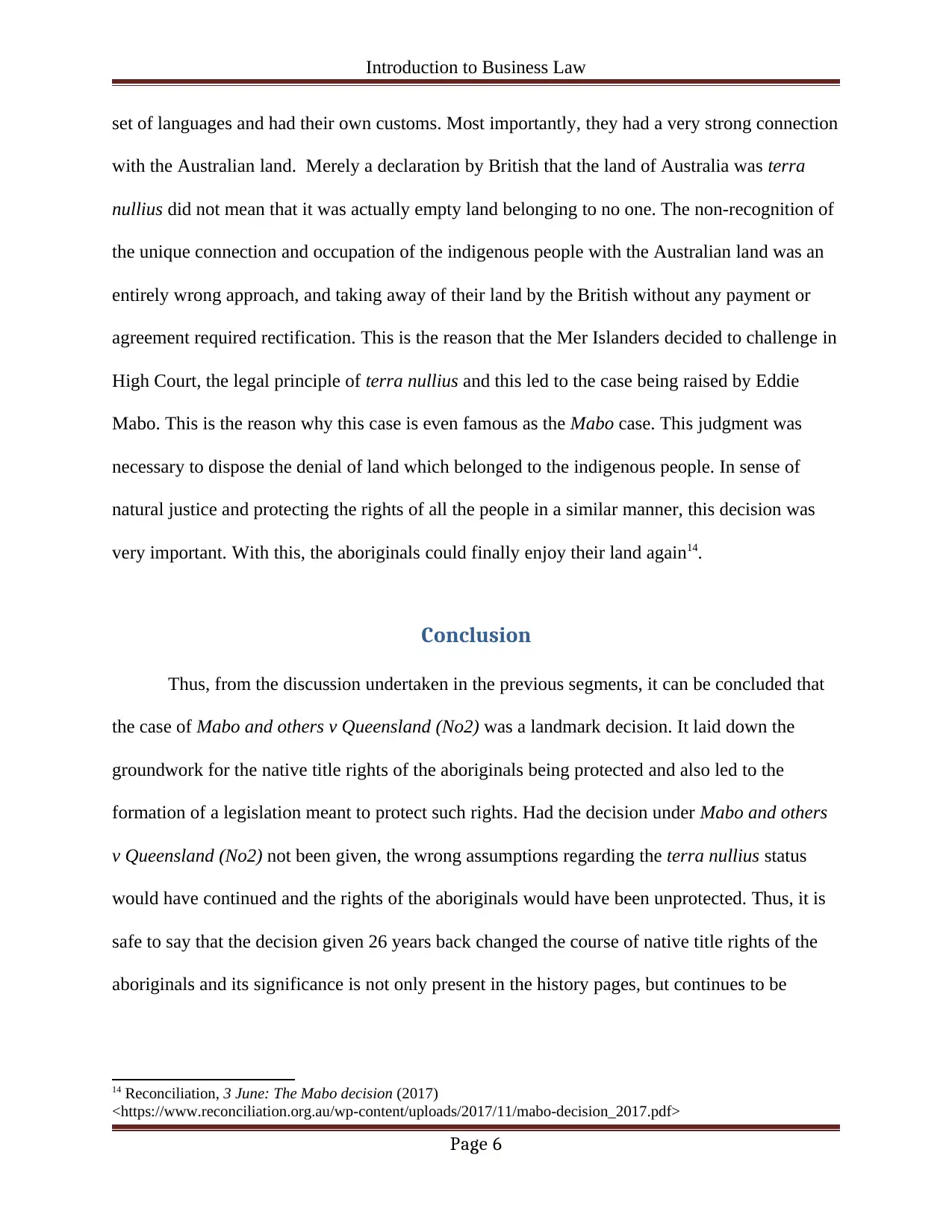
Introduction to Business Law
set of languages and had their own customs. Most importantly, they had a very strong connection
with the Australian land. Merely a declaration by British that the land of Australia was terra
nullius did not mean that it was actually empty land belonging to no one. The non-recognition of
the unique connection and occupation of the indigenous people with the Australian land was an
entirely wrong approach, and taking away of their land by the British without any payment or
agreement required rectification. This is the reason that the Mer Islanders decided to challenge in
High Court, the legal principle of terra nullius and this led to the case being raised by Eddie
Mabo. This is the reason why this case is even famous as the Mabo case. This judgment was
necessary to dispose the denial of land which belonged to the indigenous people. In sense of
natural justice and protecting the rights of all the people in a similar manner, this decision was
very important. With this, the aboriginals could finally enjoy their land again14.
Conclusion
Thus, from the discussion undertaken in the previous segments, it can be concluded that
the case of Mabo and others v Queensland (No2) was a landmark decision. It laid down the
groundwork for the native title rights of the aboriginals being protected and also led to the
formation of a legislation meant to protect such rights. Had the decision under Mabo and others
v Queensland (No2) not been given, the wrong assumptions regarding the terra nullius status
would have continued and the rights of the aboriginals would have been unprotected. Thus, it is
safe to say that the decision given 26 years back changed the course of native title rights of the
aboriginals and its significance is not only present in the history pages, but continues to be
14 Reconciliation, 3 June: The Mabo decision (2017)
<https://www.reconciliation.org.au/wp-content/uploads/2017/11/mabo-decision_2017.pdf>
Page 6
set of languages and had their own customs. Most importantly, they had a very strong connection
with the Australian land. Merely a declaration by British that the land of Australia was terra
nullius did not mean that it was actually empty land belonging to no one. The non-recognition of
the unique connection and occupation of the indigenous people with the Australian land was an
entirely wrong approach, and taking away of their land by the British without any payment or
agreement required rectification. This is the reason that the Mer Islanders decided to challenge in
High Court, the legal principle of terra nullius and this led to the case being raised by Eddie
Mabo. This is the reason why this case is even famous as the Mabo case. This judgment was
necessary to dispose the denial of land which belonged to the indigenous people. In sense of
natural justice and protecting the rights of all the people in a similar manner, this decision was
very important. With this, the aboriginals could finally enjoy their land again14.
Conclusion
Thus, from the discussion undertaken in the previous segments, it can be concluded that
the case of Mabo and others v Queensland (No2) was a landmark decision. It laid down the
groundwork for the native title rights of the aboriginals being protected and also led to the
formation of a legislation meant to protect such rights. Had the decision under Mabo and others
v Queensland (No2) not been given, the wrong assumptions regarding the terra nullius status
would have continued and the rights of the aboriginals would have been unprotected. Thus, it is
safe to say that the decision given 26 years back changed the course of native title rights of the
aboriginals and its significance is not only present in the history pages, but continues to be
14 Reconciliation, 3 June: The Mabo decision (2017)
<https://www.reconciliation.org.au/wp-content/uploads/2017/11/mabo-decision_2017.pdf>
Page 6
⊘ This is a preview!⊘
Do you want full access?
Subscribe today to unlock all pages.

Trusted by 1+ million students worldwide
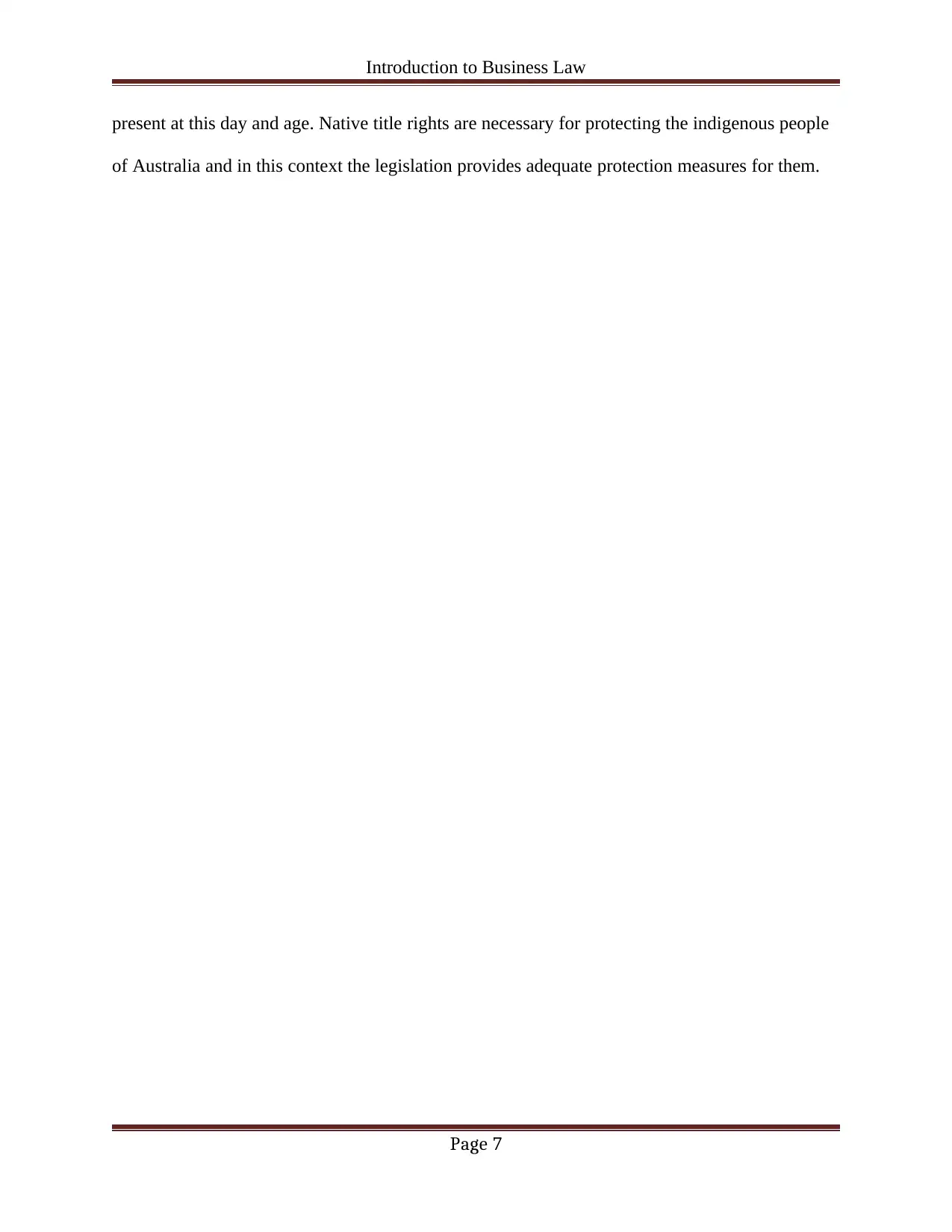
Introduction to Business Law
present at this day and age. Native title rights are necessary for protecting the indigenous people
of Australia and in this context the legislation provides adequate protection measures for them.
Page 7
present at this day and age. Native title rights are necessary for protecting the indigenous people
of Australia and in this context the legislation provides adequate protection measures for them.
Page 7
Paraphrase This Document
Need a fresh take? Get an instant paraphrase of this document with our AI Paraphraser
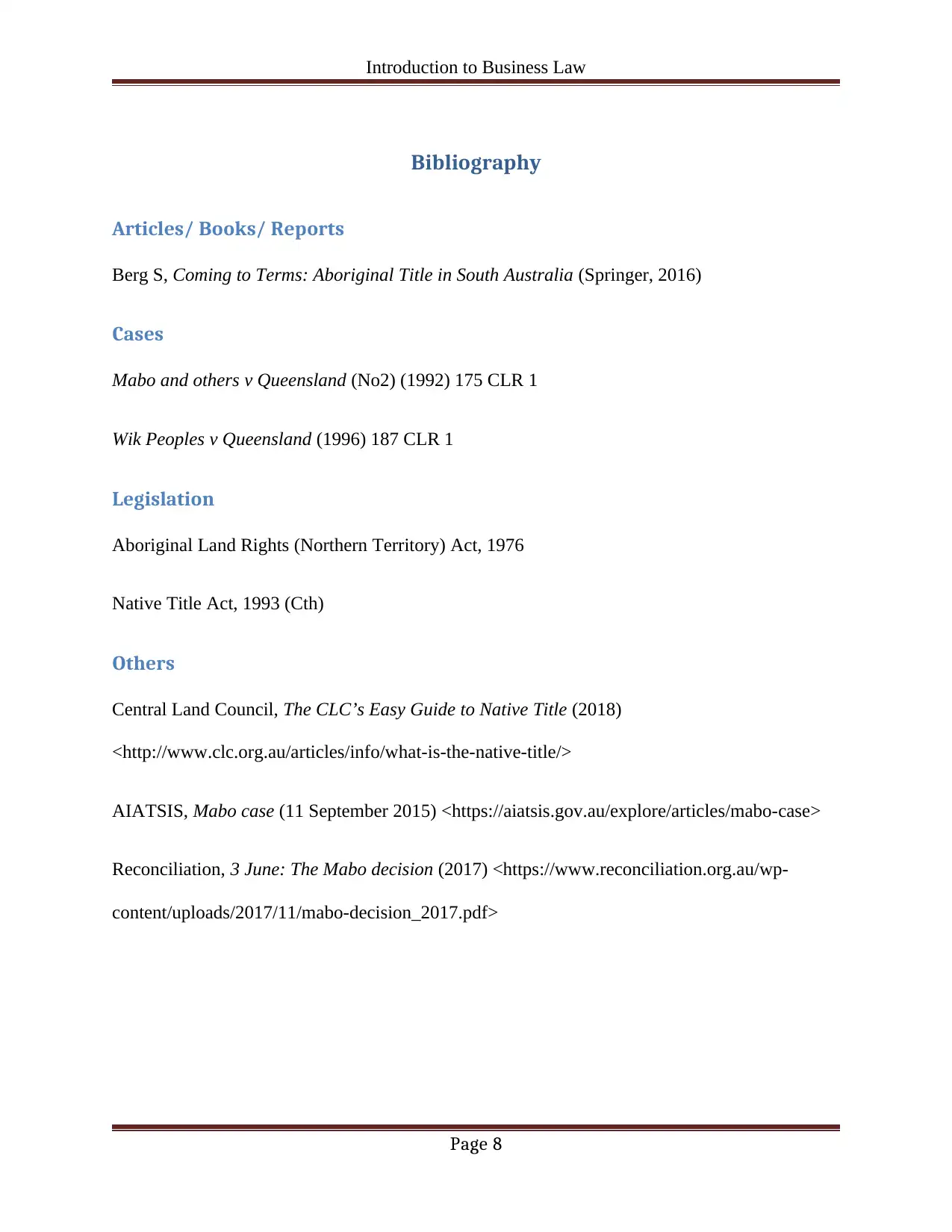
Introduction to Business Law
Bibliography
Articles/ Books/ Reports
Berg S, Coming to Terms: Aboriginal Title in South Australia (Springer, 2016)
Cases
Mabo and others v Queensland (No2) (1992) 175 CLR 1
Wik Peoples v Queensland (1996) 187 CLR 1
Legislation
Aboriginal Land Rights (Northern Territory) Act, 1976
Native Title Act, 1993 (Cth)
Others
Central Land Council, The CLC’s Easy Guide to Native Title (2018)
<http://www.clc.org.au/articles/info/what-is-the-native-title/>
AIATSIS, Mabo case (11 September 2015) <https://aiatsis.gov.au/explore/articles/mabo-case>
Reconciliation, 3 June: The Mabo decision (2017) <https://www.reconciliation.org.au/wp-
content/uploads/2017/11/mabo-decision_2017.pdf>
Page 8
Bibliography
Articles/ Books/ Reports
Berg S, Coming to Terms: Aboriginal Title in South Australia (Springer, 2016)
Cases
Mabo and others v Queensland (No2) (1992) 175 CLR 1
Wik Peoples v Queensland (1996) 187 CLR 1
Legislation
Aboriginal Land Rights (Northern Territory) Act, 1976
Native Title Act, 1993 (Cth)
Others
Central Land Council, The CLC’s Easy Guide to Native Title (2018)
<http://www.clc.org.au/articles/info/what-is-the-native-title/>
AIATSIS, Mabo case (11 September 2015) <https://aiatsis.gov.au/explore/articles/mabo-case>
Reconciliation, 3 June: The Mabo decision (2017) <https://www.reconciliation.org.au/wp-
content/uploads/2017/11/mabo-decision_2017.pdf>
Page 8
1 out of 8
Related Documents
Your All-in-One AI-Powered Toolkit for Academic Success.
+13062052269
info@desklib.com
Available 24*7 on WhatsApp / Email
![[object Object]](/_next/static/media/star-bottom.7253800d.svg)
Unlock your academic potential
© 2024 | Zucol Services PVT LTD | All rights reserved.


![Mabo Case [No.2]: Analyzing Impact on Australian Legal System](/_next/image/?url=https%3A%2F%2Fdesklib.com%2Fmedia%2Fmabo-case-impact-australian-legal-system_page_2.jpg&w=256&q=75)


